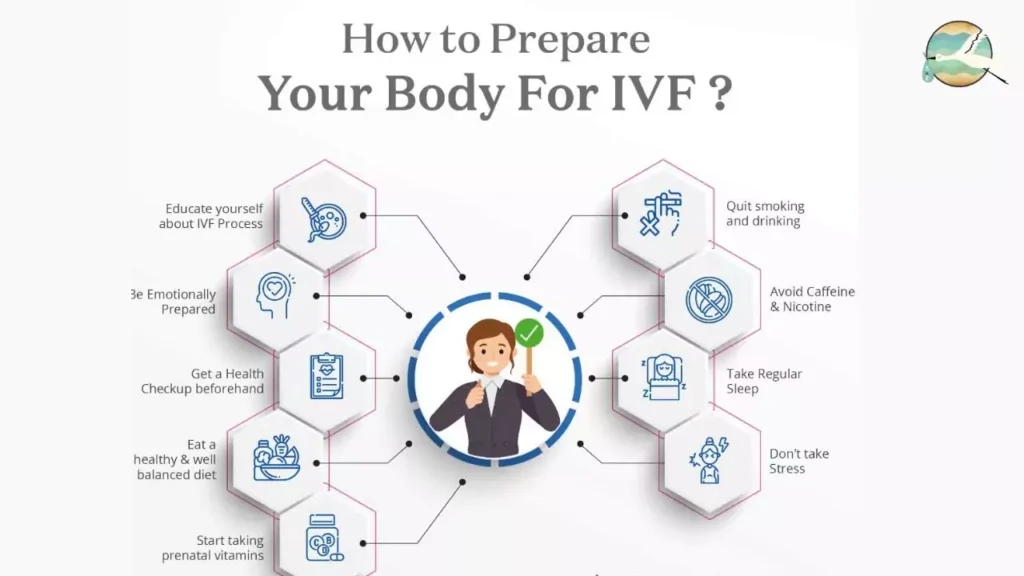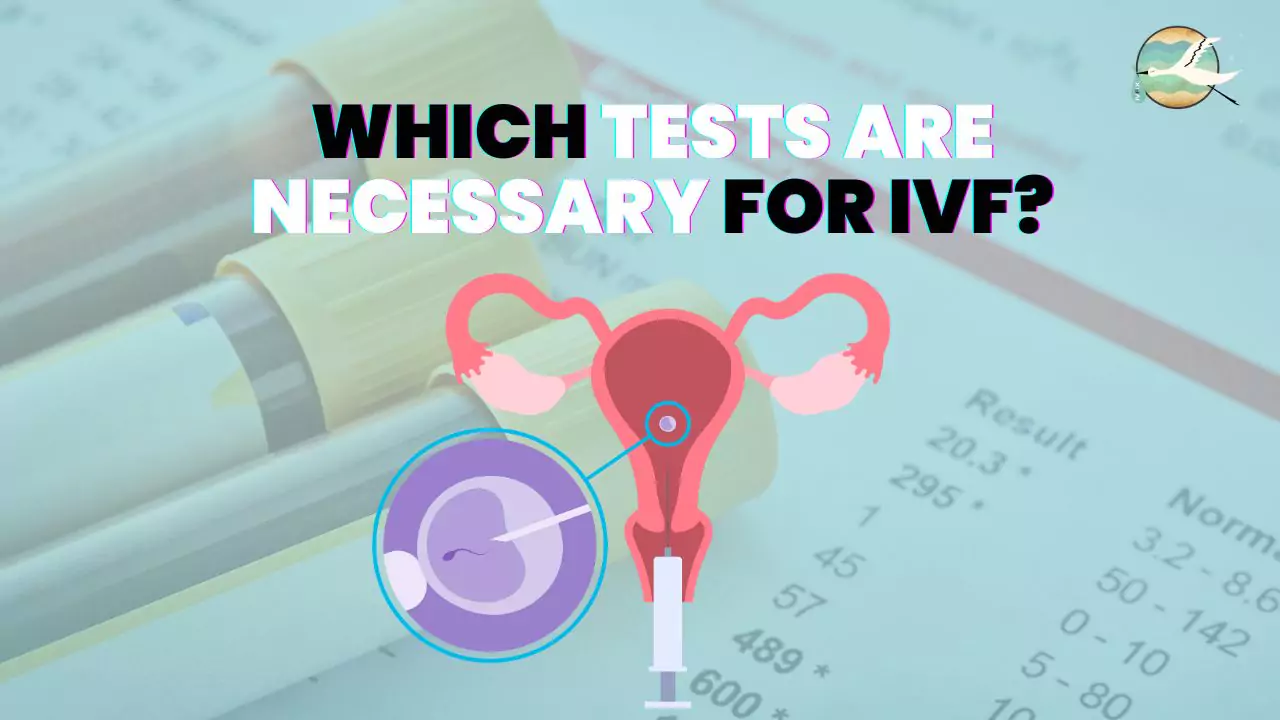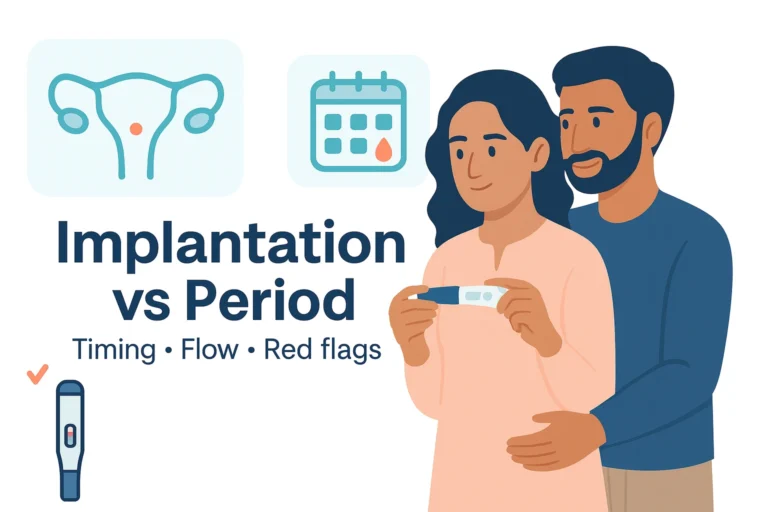Looking to undergo IVF? Learn about Which Tests Are Necessary for IVF journey. Our comprehensive guide covers all the necessary tests, ensuring you’re well-prepared for the process.
The fertility procedure known as IVF gives hope to couples who are having trouble conceiving. The journey of IVF is both exciting and challenging, requiring a number of crucial tests to ensure success. These tests are crucial for determining the couple’s fertility, identifying any barriers, and modifying the treatment plan as needed. Let’s explore the world of IVF testing and learn which tests are necessary.
Which Tests Are Necessary for IVF?

IVF tests are performed following a thorough medical consultation. The doctor takes into account your medical history and discusses your options during the consultation.
Before an IVF procedure, the following tests are carried out:
Ovarian reserve testing: It is a blood hormone test that gives the doctor information about the woman’s ovarian reserve and the total number of eggs she has in her womb. This test primarily searches for hormones like FSH, AMH, and estradiol. These hormones assist in determining the number of eggs, uterine lining, and fallopian tubes.
Tubal patency test: HSG (Hysterosalpingography) test is another name for it. This examination is used to look for things that an ultrasound or an X-ray cannot detect. A contrast material is inserted into the fallopian tube during this procedure via the uterus. This aids in determining the state of the uterus and whether the fallopian tube is blocked.
Tests for infectious diseases: The doctor will perform tests to check for infectious diseases like HIV, Chlamydia, Rubella, etc. before moving forward with IVF. This is due to the disease’s potential to impair the fetus’ growth and cause complications down the road.
Semen evaluation: To evaluate the semen, a sample of sperm will be taken and sent to a lab for analysis. A semen test enables the determination of the sperm’s shape, motility, number, and concentration. If the male partner is found to be infertile, ICSI may be recommended by the doctor. ICSI is a cutting-edge technique that involves inserting sperm into the egg.
Prolactin and thyroid hormones test: The primary hormone for producing breast milk is prolactin, and high levels of this hormone can have an impact on pregnancy. The various metabolic processes benefit from the thyroid hormones. Pregnancy can also be impacted by thyroid hormone levels that are higher or lower. This test aids the physician in selecting the appropriate medications to balance hormone levels.
Mock embryo transfer: It is an optional test used to determine whether the embryo transfer has any chance of leading to pregnancy. This test enables the physician to understand how the uterus will respond to the procedure. The doctor will therefore take the necessary precautions to customize the actual procedure.
In order to determine whether IVF is the best course of treatment for you, the tests mentioned above are crucial tests. Your doctor should be consulted regarding the tests that must be performed prior to IVF. Only determining whether there are chances of conceiving with IVF treatment is helped by all of these tests.

What are the Benefits of Pre-IVF Tests?
Starting the process of in vitro fertilization (IVF) is a big step toward achieving your goal of becoming a parent. Pre-IVF testing offers many advantages that help the success of the process and the general health of both you and your future kid as you get ready for this life-changing adventure. In this post, we’ll examine the benefits of these exams and show how they’re essential to enhancing your IVF process.
Personalized Treatment Plans
Pre-IVF tests offer priceless insights regarding the state of your particular fertility. Your medical team can develop a treatment strategy that fits your particular needs by evaluating your hormone levels, ovarian reserve, and genetics. This individualized strategy maximizes the success rate of the IVF process, increasing your chances of a positive result.
Identifying Underlying Health Issues
Pre-IVF examinations can reveal any underlying medical issues that may affect the effectiveness of the treatment or offer dangers during pregnancy, beyond only reproductive considerations. Prior to IVF, conditions like infectious infections and uterine anomalies can be identified and treated, making the process safer and healthier for you and your unborn child.
Optimal Timing and Ovulation Tracking
Ovulation evaluation and ovarian reserve testing are two pre-IVF tests that offer vital details about your menstrual cycle and ovulation timing. With this information, your medical team can time the IVF treatment correctly, improving the chances that the eggs will be successfully removed and fertilized.
Minimizing the Risk of Genetic Disorders
Pre-IVF testing must include genetic screening as a crucial step. You can choose the right embryo and lessen the chance of passing on inherited diseases to your child by looking for probable genetic defects or carrier statuses.
Enhancing Emotional Preparedness
Pre-IVF tests can provide you with a better idea of the state of your fertility and any potential problems. Your emotional readiness for the IVF process will improve as a result of your knowledge, which will also help you feel in control and less stressed.
Increased Pregnancy Success Rates
Pre-IVF test results provide comprehensive information that helps increase pregnancy success rates. You can improve your chances of getting pregnant by taking care of any underlying health conditions, balancing your hormones, and choosing genetically sound embryos.
Cost-Effective Approach
Pre-IVF testing requires an initial time and resource commitment, but it may ultimately turn out to be cost-effective in the long run. Before the IVF operation, you might perhaps avoid difficulties that could call for additional treatments or interventions by recognizing and resolving probable hurdles.
Informed Decision-Making
Knowledge is a powerful weapon, particularly when deciding on crucial aspects of your reproductive journey. Pre-IVF tests give you a wealth of knowledge that enables you to make wise decisions and points you in the direction of the best outcomes.
Peace of Mind
Last but not least, the peace of mind that pre-IVF tests provide may be one of their most important advantages. Uncertainty and anxiety can be reduced by knowing that you have taken proactive measures to improve your fertility health, enabling you to approach the IVF procedure with a positive and certain perspective.
Read More: How Many Injections for IVF Treatment?
Conclusion: Which Tests Are Necessary for IVF?
Starting the IVF process is a big step toward fulfilling your desire of becoming a parent. The foundation of IVF success is comprehensive testing, which helps doctors develop specialized treatment programs. You may arm yourself with the knowledge and insight to make wise decisions if you know which tests are required for IVF. Keep in mind that every person’s journey is distinct, and the correct tests pave the way for a more straightforward road to parenting.

FAQs About Which Tests Are Necessary for IVF?
Q: Are all these tests mandatory for every IVF candidate?
A: The tests are suggested based on each person’s unique situation. The testing schedule will be customized to meet the unique needs of your fertility specialist.
Q: How do these tests contribute to IVF success?
A: These tests provide critical insights into the couple’s fertility status, allowing medical professionals to customize treatment plans for better success rates.
Q: Is hormone testing only for women?
A: No, hormone testing is relevant for both partners, as hormonal balance is essential for successful conception.
Q: Can psychological assessments impact IVF outcomes?
A: Yes, addressing emotional well-being positively influences the IVF experience and outcomes.
Q: Are these tests covered by insurance?
A: Coverage varies, so it’s advisable to consult your insurance provider and fertility specialist.
Q: How do I choose the right fertility clinic for IVF?
A: Research and read reviews, consider success rates, and schedule consultations to make an informed decision.








[…] Also Read: Which Tests Are Necessary for IVF? […]
[…] Which Tests Are Necessary for IVF? […]